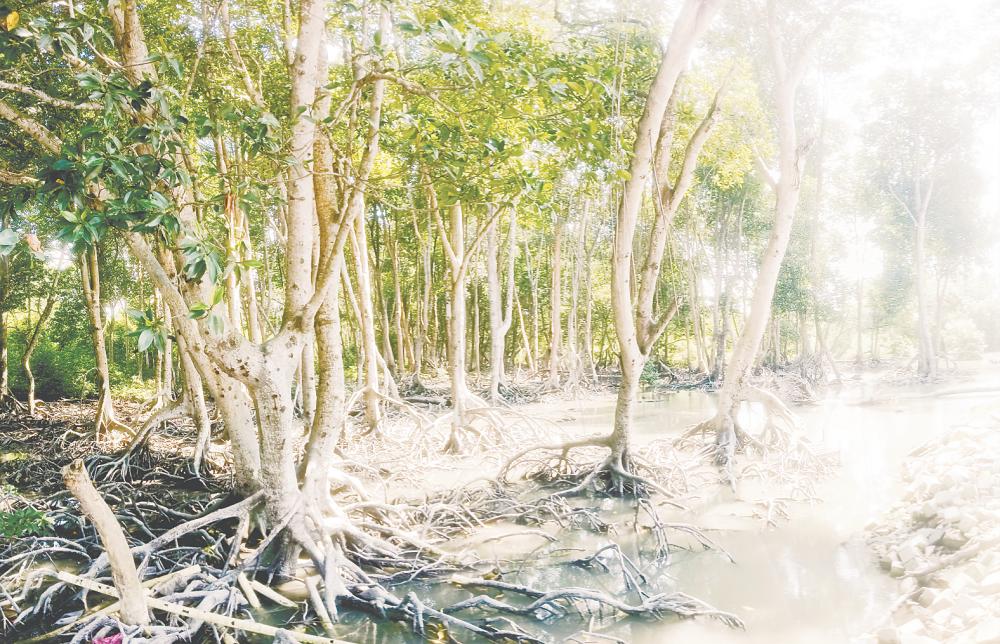PETALING JAYA: The destruction of mangrove forests in Malaysia is threatening critical ecosystems, undermining coastal protection, and jeopardising environmental sustainability, warn experts.
The Forest Research Institute Malaysia said as of 2024, Malaysia’s mangrove forests span 586,548ha, making them among the world’s largest. Of these, 549,818ha or 93.74% are designated as protected areas, while the remaining falls under state and alienated land.
Universiti Kebangsaan Malaysia Institute for Environment and Development Assoc Prof
Dr Ahmad Aldrie Amir said mangroves are indispensable in combatting climate change but are often undervalued and overlooked.
“They are blue carbon ecosystems, which mean they capture and store significant amounts of carbon from the atmosphere and ocean. They are also among the most effective natural solutions for mitigating rising temperatures and adapting to global climate change.
“Beyond their carbon-capturing abilities, mangroves act as natural barriers, protecting coastlines from tsunamis, storms, and extreme weather. They also filter pollutants before they reach the ocean and serve as buffers, shielding coastal communities from strong winds.”
He said mangroves are also crucial for biodiversity, providing breeding grounds for fish, sanctuaries for birds and marine mammals, and habitats for countless marine species.
“They are essential for maintaining the balance of both terrestrial and marine ecosystems.”
However, despite their ecological significance, mangroves continue to face destruction, with the recent mass die-off of mangrove trees in Kuala Sungai Pinang in Balik Pulau, Penang, an example of unchecked environmental damage.
On Feb 10, Consumers Association of Penang (CAP) president Mohideen Abdul Kader attributed the death of mangrove trees between Kuala Sungai Pinang and Kuala Sungai Bharu to waste discharge from nearby shrimp farming ponds.
“Given that mangrove forests are crucial ecosystems for the breeding of various marine species, CAP is concerned that the situation will severely impact the environment as well as livelihoods of about 500 coastal fishermen in the area,” he said.
Ahmad Aldrie stressed that mangroves are still being cleared for short-term economic gains, including the development of aquaculture ponds, housing, hotels, and resorts, and that major infrastructure projects, such as ports, roads, and urban expansion, are also destroying mangroves.
“Upstream economic activities such as logging, agriculture and industrial operations generate runoff that pollutes rivers, mangroves, and coastal habitats, while construction of landfills near rivers and intertidal zones worsens the situation.”
Universiti Malaysia Terengganu Institute of Oceanography and Environment Assoc Prof Dr Behara Satyanarayana echoed similar concerns and identified land use conversion as a primary driver of the country’s mangrove destruction.
“In an era of rising sea levels and climate change, mangrove destruction is particularly alarming. Land conversion for aquaculture, agriculture, and urban development has also reduced mangrove cover in Malaysia and globally.”
Behara also warned that mangrove loss has far-reaching consequences for coastal communities that depend on them for their livelihoods.
“For many, mangroves are a lifeline that supports local economies and traditional ways of life. Their destruction has profound socio-economic consequences which are underestimated.”
He urged the authorities and the public to collectively protect such vital ecosystems and said a unified approach is crucial to safeguarding mangroves for future generations.
“Mangrove destruction doesn’t just impact nature, it disrupts human communities as well.”
Behara stressed the need for collaboration among corporate sectors, government agencies, and research institutions to improve funding opportunities, enhance management practices, and ensure long-term monitoring of mangrove ecosystems for the sake of the planet and well-being of future generations.









